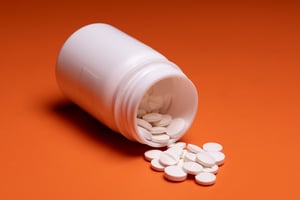Prescription Amphetamines Pose Dose-Dependent Risk for First-Time Psychosis or Mania

Young people taking prescription amphetamines were nearly three times more likely to develop first-episode psychosis or incident mania than those taking methylphenidate, according to a study issued today by AJP in Advance.
The Food and Drug Administration added warnings to prescription stimulant labels in 2007 after studies showed they increased risk of psychotic or manic symptoms, even among patients with no history of these symptoms. Despite a more than five-fold increase in prescribing rates in the past two decades, “there are currently no published studies to guide prescribers on dose levels and other factors that impact the rare but serious risk,” wrote Lauren V. Moran, M.D., M.P.H., of McLean Hospital in Belmont, Massachusetts, and colleagues.
Moran and colleagues analyzed health records for first-time inpatients aged 16 to 35 years at McLean Hospital between 2005 and 2019. They matched 1,374 individuals who were experiencing initial psychosis or new onset mania with 2,748 admitted with other diagnoses.
After factoring in other substance use, patient psychiatric history, and other variables, the researchers found that patients with any past-month prescription amphetamine use were 2.7 times more likely to develop psychosis or mania than those with no use. Patients taking high doses of amphetamines—defined as >30 mg dextroamphetamine or equivalent (40 mg of mixed amphetamine salts or 100 mg of lisdexamfetamine)—were 5.3 times more likely to have psychosis or mania. Patients aged 23 years or older had higher odds of psychosis or mania than younger patients, possibly due to the higher average amphetamine dose researchers observed in the older group.
Moreover, patients taking prescription amphetamines were 2.85 times more likely to experience incident psychosis or mania than those taking methylphenidate. Those taking methylphenidate did not have increased odds of psychosis or mania than those not taking these medications, researchers noted.
“Our results suggest that prescription amphetamine dose is the most important modifiable factor associated with stimulant-related psychosis or mania…. Our findings suggest that clinicians can mitigate the risk of psychosis or mania by avoiding doses above 30 mg dextroamphetamine equivalents,” Moran and colleagues wrote. “In patients who experience impairment from ADHD symptoms who may benefit from doses above 30 mg dextroamphetamine equivalents, careful monitoring with screening for symptoms of psychosis or mania is critically warranted.
“This is of particular importance given that psychosis and mania are often associated with lack of insight,” the researchers continued. “Symptoms that develop in the context of prescription amphetamine use could emerge without the patient’s awareness, leading to a delay in detection.”
For related information, see the Psychiatric News article “Study Finds Higher Risk of Psychosis With Amphetamines for ADHD.”
(Image: Getty Images/iStock/artisteer)
Don't miss out! To learn about newly posted articles in Psychiatric News, please sign up here.





